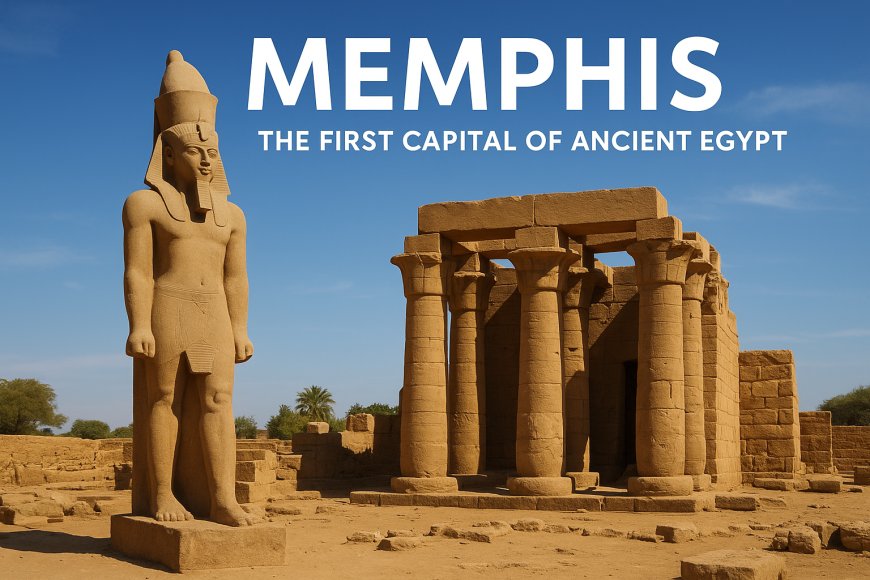Memphis: The First Capital of Ancient Egypt
Discover Memphis, the first capital of Ancient Egypt, founded around 3100 BCE by Pharaoh Menes. Learn about its role in politics, religion, trade, and its enduring archaeological legacy.

Reading Time: ~6 minutes
Among the world’s most enduring civilizations, Ancient Egypt stands tall — and at its heart was Memphis, one of the earliest and most influential capitals in history. Founded around 3100 BCE by Pharaoh Menes (Narmer), who united Upper and Lower Egypt, Memphis became the seat of political power, religion, and culture for centuries.
The Founding of Memphis
Strategically located at the apex of the Nile Delta, Memphis served as the gateway between Upper and Lower Egypt. Its central position allowed the pharaohs to consolidate control over the Nile Valley and expand influence into surrounding regions.
According to ancient tradition, Pharaoh Menes founded the city after uniting Egypt into a single kingdom, marking the dawn of the dynastic era. Memphis became the model of Egyptian statehood.
A Center of Power and Religion
Memphis was not only the political capital but also a spiritual center. The city was home to the great temple of Ptah, the creator god and patron of craftsmen. Worship of Ptah made Memphis a hub for artists, builders, and sculptors, who created some of the most iconic works of Egyptian art.
The city also served as the headquarters of Egypt’s administration, housing royal palaces, courtiers, scribes, and military leaders.
Trade and Prosperity
Due to its position near the Nile Delta, Memphis became a thriving trade hub, linking Egypt with Nubia, the Levant, and the wider Mediterranean. Goods such as gold, papyrus, grain, and precious stones passed through the city, enriching its rulers and people.
Decline and Legacy
By the time of the New Kingdom, Memphis had begun to lose its prominence to Thebes and later Alexandria. Yet it never faded entirely. Even under foreign rule — Persian, Greek, and Roman — Memphis retained religious importance and was a vital city until the end of antiquity.
Today, Memphis is an archaeological treasure. The ruins near modern Mit Rahina feature colossal statues of Ramses II, alabaster sphinxes, and remains of temples, offering a glimpse into its grandeur. The site is part of a UNESCO World Heritage designation that includes the Pyramids of Giza and surrounding necropolises.
Why Memphis Matters
Memphis represents the birth of Ancient Egypt as a unified state. It was the stage where pharaohs projected their divine authority and artisans immortalized Egypt’s grandeur in stone. Its history tells the story of Egypt’s rise as a global power of the ancient world.
Final Thoughts
To reflect on Memphis is to explore the roots of Egyptian civilization itself. It reminds us of the genius, resilience, and cultural brilliance that defined one of humanity’s greatest empires.
Have you listed your business on Afri54?
Afri54 exists to solve a fundamental challenge faced by millions of African businesses: lack of visibility. Whether you’re an automobile part seller in Lagos, a local attire manufacturer in Kigali, a coffee exporter in Addis Ababa, or a mobile phone supplier in Accra, you deserve to be seen. Join Now






















